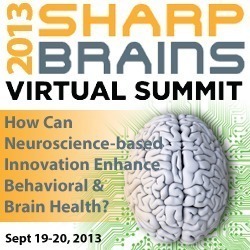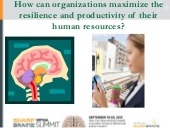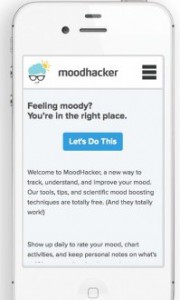NSF REAL funding to Kane to study effects of mind-wandering
http://research.uncg.edu/spotlight/nsf-real-funding-to-kane-to-study-effects-of-mind-wandering/
Sent via Flipboard
Please tell us about your interest in applied brain science. What areas are you most interested in?
I am mostly intrigued by brain training and behavioral response using neuro/biofeedback and augmented/virtual reality.
What is one important thing you are working on now, and where can people learn more about it?
We are working on ways to leverage augmented reality for fully immersive experiences that can impact mood. This will allow us to work with patients even if they are on the other side of the world.
What excites you the most about your current line of work?
As the Founder of the New Dawn Advanced Mind and Body Research and Development, I am passionate about helping people that suffer with depression, bipolar, pain and childhood issues that the current health system often wipes off as ""too hard."
What are 1–2 key things you'd like every person to understand regarding his/ her own brain and mind, that you think is commonly misrepresented or not addressed in the popular media?
I believe few people understand that anyone can refine mind state easily, either via meditation, EEG technology or even a single breath.
Where do you see clear "low-hanging fruit" to enhance behavioral and brain health based on neuroscience and innovation?
Using cutting edge technology, we can envision producing an interactive virtual reality that responds to the user's mind state using neuro/biofeedback. We are looking at a whole new world of brain training and human machine interaction.
What surprised you the most at the 2013 SharpBrains Virtual Summit?
The big data elements of the technology that is already available, which can open a world of opportunity in health, psychology and neuroscience.
Finally, what do YOU do to stay sharp?
Biofeedback for mind state training.
 —This conversation is part of the interview series with Speakers and Participants in the 2013 SharpBrains Virtual Summit (September 19-20th). Previous interviews include:
—This conversation is part of the interview series with Speakers and Participants in the 2013 SharpBrains Virtual Summit (September 19-20th). Previous interviews include:
Agency Initiative Will Focus on Advancing Deep Brain Stimulation
By JAMES GORMAN
Published: October 24, 2013
. . .
The federal Defense Advanced Research Projects Agency, known as Darpa, announced Thursday that it intended to spend more than $70 million over five years to jump to the next level of brain implants, either by improving deep brain stimulation or by developing new technology.
Justin Sanchez, Darpa program manager, said that for scientists now, "there is no technology that can acquire signals that can tell them precisely what is going on with the brain."
And so, he said, Darpa is "trying to change the game on how we approach these kinds of problems."
The new program, called Systems-Based Neurotechnology and Understanding for the Treatment of Neuropsychological Illnesses, is part of an Obama administration brain initiative, announced earlier this year, intended to promote innovative basic neuroscience. Participants in the initiative include Darpa, as well as the National Institutes of Health and the National Science Foundation.
The announcement of Darpa's goal is the first indication of how that research agency will participate in the initiative. The money is expected to be divided among different teams, and research proposals are now being sought.
Darpa's goal would require solving several longstanding problems in neuroscience, one of which is to develop a detailed model of how injuries or illnesses like depression manifest themselves in the systems of the brain.
The next step is to create a device that can monitor the signs of illness or injury in real time, treat them appropriately and measure the effects of the treatment. The result would be something like a highly sophisticated pacemaker for a brain disorder.
Darpa is asking for research teams to produce a device ready to be submitted to the Food and Drug Administration for approval within five years.
"Is it overambitious? Of course," said Dr. Mayberg, adding that working with the brain is "a slow process." But she said that it was an impressive first investment and that the clear emphasis on human illness was "stunning."
Is it possible for a brain scan to predict whether a recently paroled inmate will commit another crime within 4 years? A new study by Aharoni et al. (2013) suggests that the level of activity within the anterior cingulate cortex might provide a clue to whether a given offender will be rearrested.
Dress this up a bit and combine with a miniaturized brain-computer interface that continuously uploads EEG activity to the data center at a maximum security prison. There, machine learning algorithms determine with high accuracy whether a given pattern of neural oscillations signals the imminent intent to reoffend that will trigger deep brain stimulation in customized regions of prefrontal cortex, and you have the plot for a 1990s cyberpunk novel.
 Thanks to the generous support from our Summit Sponsors we are glad to share all slide decks from the 2013 SharpBrains Virtual Summit: How Can Neuroscience-based Innovation Enhance Behavioral and Brain Health (September 19-20th). We hope you enjoy them!
Thanks to the generous support from our Summit Sponsors we are glad to share all slide decks from the 2013 SharpBrains Virtual Summit: How Can Neuroscience-based Innovation Enhance Behavioral and Brain Health (September 19-20th). We hope you enjoy them!
–> You can check out all slide decks HERE
–> As an example, you can check out the slide deck corresponding to the session below, simply by clicking on the image.
10:15–11:45am. How can organizations maximize the resilience and productivity of their human resources? Historically, human resource departments have not had the toolkit to develop the most human resource of all – our brains. What are some large employers and insurers doing to apply emerging science and best practices in this domain, via wellness and training initiatives, and HR benefits?
 Billion pound brain project under way (BBC News):
Billion pound brain project under way (BBC News):
"Scientists from 135 institutions, mostly in Europe, are participating in The Human Brain Project (HBP). Co-funded by the EU, it aims to develop the technology needed to create a computer simulation of the brain. It will also build a database of brain research from the tens of thousands of neuroscience papers published annually.
"The Human Brain Project is an attempt to build completely new computer science technology that will enable us to collect all the information we have built up about the brain over the years," said Prof Henry Markram, Director of the HBP at EPFL (Ecole Polytechnique Fédérale de Lausanne), in Switzerland.
"We should begin to understand what makes the human brain unique, the basic mechanisms behind cognition and behaviour, how to objectively diagnose brain diseases, and to build new technologies inspired by how the brain computes."
To Learn More:
Norman Doidge, M.D., discusses why the concept of brain plasticity—the brain's ability to grow and change in structure and function in response to experience—is "the most important change in our understanding of the brain in 400 years."
 21 types of health apps the FDA could regulate but won't (MobiHealthNews):
21 types of health apps the FDA could regulate but won't (MobiHealthNews):
"The FDA final guidance finally published last week and it included very few surprises. One new section in the final guidelines — that was not included in the draft guidance — is a list of the types of apps that the FDA says will fall under its enforcement discretion. That means that these apps may meet the definition of a medical device, but the "FDA intends to exercise enforcement discretion for these mobile apps because they pose lower risk to the public…In the pages to follow is a roundup of the FDA's list of apps that it does not intend to regulate even though they meed the definition of a medical device."
 #1 Some Psychiatric Apps
#1 Some Psychiatric Apps
"According to the FDA's guidance, some psychiatric apps might meet the definition of a mobile device, but it will choose not to regulate some of these apps: "Mobile apps that help patients with diagnosed psychiatric conditions (e.g., post-traumatic stress disorder (PTSD), depression, anxiety, obsessive compulsive disorder) maintain their behavioral coping skills by providing a 'Skill of the Day' behavioral technique or audio messages that the user can access when experiencing increased anxiety"
#8 Preventative screening apps from established medical sources
"Mobile apps that use patient characteristics such as age, sex, and behavioral risk factors to provide patient-specific screening, counseling and preventive recommendations from well-known and established authorities;"
#15 Tethered PHR apps
"Mobile apps that provide patients a portal into their own health information, such as access to information captured during a previous clinical visit or historical trending and comparison of vital signs (e.g., body temperature, heart rate, blood pressure, or respiratory rate);"
#21 Many fitness and wellness apps
"Mobile apps that are intended for individuals to log, record, track, evaluate, or make decisions or behavioral suggestions related to developing or maintaining general fitness, health or wellness,…"
–> Full article: 21 types of health apps the FDA could regulate but won't (MobiHealthNews)
–> Read the FDA's final guidance for mobile medical apps (PDF)

 Which of those highlights seem more surprising or relevant to you?
Which of those highlights seem more surprising or relevant to you?
Important Note: All 15 SharpBrains Summit sessions were recorded, and 15+ hours of recordings are available now.
--> Learn Here How to Access the Recordings, so you can understand those 30 highlights in more depth, and discover many more. Registered Summit participants can use same login and password used during Summit. Others can purchase access to the full recordings (USD $175).
Sincerely,
--The Steering Group of the 2013 SharpBrains Virtual SummitAlvaro Fernandez, CEO & Co-Founder, SharpBrainsAndrew Lee, Vice President at AetnaCorinna Lathan, Founder and CEO of AnthroTronixHilal Lashuel, Associate Professor at the Swiss Federal Institute of Technology-Lausanne (EPFL)Jayne Plunkett, Head of Casualty Reinsurance at Swiss ReMatthew Bishop, New York Bureau Chief of The EconomistOlivier Oullier, Professor of Behavioral and Brain Sciences at Aix-Marseille UniversityTan Le, CEO of Emotiv Lifesciences